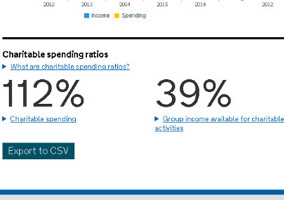Gareth Jones reflects on a turbulent year for the charity sector and the Western world, and summarises recent discussion about the future of the SORP.
And so we come to this year’s final edition of Charity Finance. I hope it is not yet too much of a cliché to state that it has been a shockingly turbulent and disconcerting year.
From the election of Donald Trump as US president to the UK’s vote to leave the European Union, political events in the Western world have confounded the pollsters, politicians, media and liberal elite in equal measure.
These events appear to be driven by cynicism about the motives and competence of people in positions of power. In some ways this is justifiable, and those who govern us must be scrutinised. Yet the tendency to dismiss expert opinion altogether is worrying.
Unfortunately, charities have not been immune to the sceptical mood. Scandals in fundraising and the collapse of Kids Company, when fanned by a hostile media, have come to be seen as symptomatic of problems across the charity sector as a whole.
With public understanding of the nature of charity out of sync with a modern, professionalised sector, suspicion abounds. The Charity Commission’s Public trust and confidence in charities report this year saw trust fall to 5.7 out of 10, having previously been stable at 6.7 in 2012 and 2014.
There are no easy solutions to this conundrum, but reform of fundraising regulation is a good start, provided the new regulator can command the support of the sector.
Charities also need to continue working hard to engage with the media, robustly defending themselves when under attack and proactively explaining the good work they do the rest of the time.
Here’s hoping that in 2017, the charity sector can have a quietly effective year and see trust start to return.
Meanwhile, the SORP…
It is perhaps a stretch to think that changes to the SORP can have a major impact on public trust.
Charitable giving is more of an emotional act than a coldly rational one, and few donors will take the time to interrogate the complexities of a charity’s annual report and accounts.
However, annual reports and accounts do have a role to play in communicating to those donors, funders, journalists and beneficiaries that do take the time to read them.
For this reason, debate around the SORP Committee’s Research exercise on Charities SORP (FRS 102) has been lively and interesting to follow.
A number of proposals have drawn comment, including that charities should name their material donors and the amounts they give, that support costs should be broken down into separate categories for “fundraising” and “administrative” costs, and that charities should disclose when expenditure falls outside the jurisdiction they are registered in.
There is also the proposal for a “key facts summary” to be included with the report. In some ways this could be useful – the statement of financial activities is hardly easy for the lay user to interpret, and drawing out basic figures such as income and expenditure is good communications practice.
However, as I wrote in this Charity Finance magazine last month, the suggestion that it could include charitable expenditure as a percentage of total income is worrying and should be removed.
Fortunately, the Financial Reporting Council will scrutinise the decisions made by the SORP Committee to ensure they reflect the majority views of consultation respondents.
With this in mind, it is incumbent on charities to make their voices heard and ensure that the right outcomes are reached. The deadline for responses is 11 Dec, so there is not long now to have your say.
Related articles












